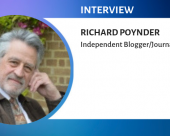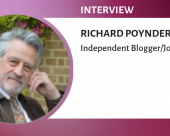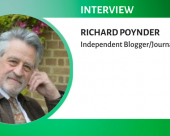Increased openness is the best way to tackle ethical problems in research and publishing
Interview with Richard Poynder
To celebrate the OA Week weekend, we bring you a series of insightful interviews with independent journalist/blogger Richard Poynder. Typically, the people who talk or write about scholarly publishing are academicians, librarians, authors, publishers, or editors themselves and their perspectives stem from their personal knowledge and experiences. But for Richard, being a non-academic does not get in the way of high-quality reporting. In an exciting four-part interview series, Richard talks to us about his interest in scholarly publishing, issues surrounding open access publishing today, the need for transparency in research and publishing, his view on the theme of the 2015 International Open Access Week, and much more!

I am in conversation with Richard Poynder, an independent journalist/blogger who is passionate about scholarly communication and open access. In the first segment of this interview series, Richard mentioned that along with providing open access to research articles, it is important to develop workable business models, but sometimes this can lead to an unforeseen set of problems. In this segment, Richard elaborates on this statement and talks in detail about APCs and paywalls. He also speaks about how publishers are not as transparent as they should be and suggests that, amongst other things, greater transparency could address the problems created by the emergence of predatory publishers. Authors, says Richard, can be equally guilty when they succumb to publication and career advancement pressures, and adopt unethical publication practices as a result.
Richard is well known for his work, most of which he publishes on his blog Open and Shut? Among Richard’s most popular publications are three series of interviews. The blog-based open-access book The Basement Interviews includes Richard’s interviews with leading advocates of the various open and free movements. The Open Access Interviews and The State of Open Access series document Richard’s conversations with open access advocates and practitioners. Richard is also moderator of the Global Open Access List (GOAL). Over the years, Richard’s work has received a lot of attention. Stevan Harnad, well-known open access activisMDPt, described Richard as the “chronicler, conscience, and gadfly laureate” of the open access movement.
Previously, Richard, you mentioned that open access can introduce its own set of problems. What sort of problems do you think free, unrestricted access to information can lead to?
Providing access to free content is great, but the way it is paid for can lead to unforeseen issues. In the case of the APC model, for instance, it has encouraged the emergence of predatory publishing, with some publishers being happy to charge authors to publish their papers but neglecting to provide adequate peer review (or any peer review at all). Essentially, such publishers are just dumping papers on the Web with little or no quality control, or independent scrutiny. This is a serious issue!
And while pay-to-publish may be good for the readers of research, we have to wonder whether it will not make the situation worse rather than better for authors, particularly those who cannot afford to pay APCs, many of whom are based in the developing world.
We also need to see this in the context of the wider consequences of creating a world of free information. This has led, for instance, to an increasing amount of content on the Web being created in order to serve commercial vested interests. This may be content that has been reproduced from press releases by reporters and websites wanting to generate new “stories” or replenish their sites without too much effort. Or, it might be entire articles written directly by corporations or their agents in order to promote their business and products. For websites, this is a means of generating additional content at no cost. Strikingly, however, much of this donated content does not have any “competing interests” declaration attached to it.
This has implications for science. For instance, the practice of reporting by press release (described as “churnalism” here) is growing, as newspapers and other media organisations lay off specialist science reporters in order to cut costs. Combined with the pressure on researchers and their institutions to demonstrate that they are making good use of public money by publishing more and more papers, we see a flood of press releases, news conferences, and even glitzy videos promoting these papers. As PR tools, these inevitably tend to exaggerate research results. Moreover, with more and more reporting now done by journalists without a science background, reporters are not necessarily qualified to judge the assertions and claims made in press releases, which can in turn lead to even greater exaggeration. As this becomes more apparent, there is a danger that the public will begin to lose faith in science.
The intrusion of vested interests in content creation can involve pharmaceutical products and surgical procedures, too.
Recently, for instance, Wikipedia banned hundreds of “Black Hat” editors who were being paid by those with vested interests to edit articles. Meanwhile, large publishers like Elsevier are promoting their content by the back door—by providing Wikipedians with access to paywalled articles so as to encourage them to use papers published by Elsevier as their cited sources. Since the vast majority of readers will not have access to these sources, the public will have no choice but to take things on trust, which is a far cry from the democratic principles on which Wikipedia was founded, and puts a different spin on free content.
All this comes at a time when government support for research is in decline, and private support is filling the vacuum. Once again, there is a danger that vested interests could subvert the world of science, with corporate funding rightly described as “science’s worst enemy.”
In short, research, publishing, and reporting are all being infiltrated by financial and other vested interests. And open access has to be seen in this larger context. Indeed, rather than mitigating such developments, open access could end up facilitating them. After all, pharmaceutical and medical device companies are now in a better position to buy faux legitimacy by funding ghost-written articles in open access journals as a way of promoting their drugs and medical products, not least by turning to those predatory journals that pay only lip service to peer review.
Free content comes at a price. While it is a good thing, we need to be aware of the downsides as well as the upsides.
In a blog post on transparency in publishing, you state that both scholarly publishers and researchers should “be committing themselves to much greater transparency than we see today.” Could you elaborate on this?
That post was an extract from the introduction to the interview I did with the publisher MDPI, which is on Jeffrey Beall’s list of “Potential, possible, or probable predatory scholarly open-access publishers.”1 Since Beall is routinely accused of placing publishers on his list without just cause, I occasionally do an in-depth interview with one of them to try and establish whether Beall’s critics are right.
Having done a number of these interviews over the past eight years or so, I have had to conclude that there is too little transparency in scholarly publishing to determine that any particular company is predatory, although predatory publishers do certainly exist.
Like most scholarly publishers, for instance, MDPI currently practises blind peer review. MDPI may be an entirely ethical publisher, but the issue here is that if the review process is non-transparent, we cannot judge whether submitted papers are being adequately peer reviewed — which is the most common allegation about predatory publishers. If the reviewing takes place in secret, how can we know what process a paper has gone through before it is published?
Many publishers (both open access and subscription) are also routinely accused of gouging the public purse by overcharging for their services. The problem here is that scholarly publishing is not a true market (and thus not subject to price discipline), so publishers can effectively charge what they like. If a publisher’s finances are non-transparent, we cannot really judge whether its prices are fair or not.
For this reason, I believe publishers ought to be more transparent, not just in their processes but in their finances as well, and I believe that by doing so they could help themselves as well as the research community.
But this reticence may be changing, too! Recently, for instance, Frontiers published some details of its finances. This is a welcome development, although what was published was not the accounts themselves but inadequate extracts from the audited accounts.
The issue of financial transparency is by no means confined to open access publishers. Open access advocates frequently accuse legacy publishers of predatory pricing. They also complain about the secrecy surrounding subscription journal pricing, especially with Big Deals and their associated NDAs. And they argue that even when publishers are public companies (and so required to file their accounts), they obfuscate the figures.
Transparency is important for three reasons. First, one way for publishers to respond to, or avoid, charges of predatory behaviour is to be more transparent, both in their business practices and in their finances. Second, since their income largely comes from the public purse, I believe there is a moral obligation on them to be more transparent.
Third, in recent years we have seen a loss of trust in scholarly publishing. This is a result of growing concern over the so-called reproducibility problem; the growth of scientific misconduct including data fabrication, photo manipulation, and the peddling of fake peer reviews; there is also continuing unease about publication bias.
The best way of tackling these problems is through increased openness, not just open access, but open peer review, open data, and more transparent publication processes.
It is also important to stress that this is an issue not just for publishers, but for researchers as well. In my opinion, researchers are less transparent than they ought to be. And they too easily succumb to the intense pressure to publish more papers and advance their careers by opting for suspicious journals that offer fast and easy publication.
In short, responsibility for many of the problems we see in research and scholarly publishing today must be laid at the feet of the entire research community, not just greedy publishers. And I believe the best way of addressing these problems is through greater transparency.
Thanks, Richard, for the detailed insights.
1 On October 27, 2015, Jeffrey Beall removed MDPI from his list of “Potential, possible, or probable predatory scholarly open-access publishers”.
Let us now move to the third segment of this fantastic interview series with Richard Poynder, where he shares his experiences interacting with academics and publishers, and trying to access open research. Richard also talks about "Open for Collaboration" - the theme for the 2015 International Open Access Week.
Other parts in the series:
Published on: Oct 23, 2015
Comments
You're looking to give wings to your academic career and publication journey. We like that!
Why don't we give you complete access! Create a free account and get unlimited access to all resources & a vibrant researcher community.















